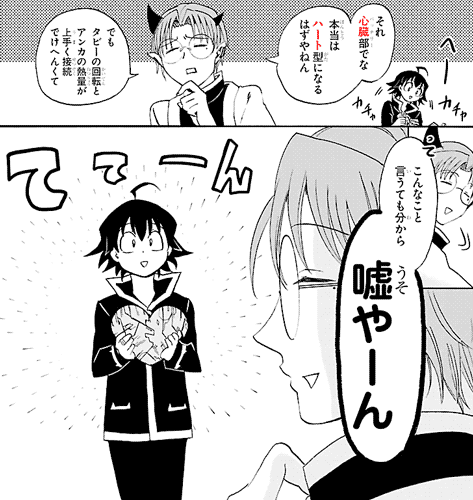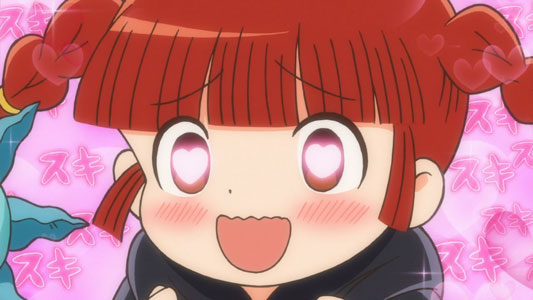心臓
The word shinzou 心臓 is the "heart" in the sense of the organ that pumps blood. The body part.- shinzou ni warui
心臓に悪い
Bad for the heart.- Scares, surprises, things that make your heart pressure rise.
- shinzou-byou
心臓病
Heart illness. - shinzou hassa
心臓発作
Heart attack. - shinzou mahi
心臓麻痺
"Heart paralysis." Cardioplegia, the temporary cessation of cardiac activity. - shinzou ishoku
心臓移植
Heart transplant. - shinzou no kodou
心臓の鼓動
Palpitation of the heart. Heartbeat.
From that sense, it can also mean the heart of a machine, the component that makes it move and function.
- shinzou-bu
心臓部
Heart part.
Core component. - taiyou-kou hatsuden-sho no shinzou-bu
太陽光発電所の心臓部
The heart-part of a sun-light electricity-station.
The core component of solar power plant.- That could be the solar panels, for example.
A bunch of words that mean "center" or "core" can also translate to "heart" in English, like chuushin 中心 and kakushin 核心.
心
The word kokoro 心 also translates to "heart." The difference between kokoro and shinzou is that shinzou is literally the physical organ, while kokoro is used in figurative phrases about feelings.- shinzou ga kodou suru
心臓が鼓動する
The heart palpitates.- A normal, physiological process.
- kokoro ga dokidoki suru
心がドキドキする
The heart goes *thump thump.*- Probably because love.
Some related expressions include:
- kokoro ga ugoku
心が動く
The heart moves. (literally.)
To be moved (emotionally).- kokoro wo ugokaseru
心を動かせる
To make [someone's] heart move.
To move [someone] (emotionally).
- kokoro wo ugokaseru
- kokoro ni fureru
心に触れる
(For something) to touch [one's] heart. - kokoro atatamaru
心温まる
To warm the heart.
To be heart-warming.
The phrase "from heart" often literally translates to kokoro kara 心から.
- kokoro kara kansha shite-iru
心から感謝している
[I] thank [you] from my heart. - kokoro no soko kara ai shite-iru
心の底から愛している
[I] love [you] from the bottom of [my] heart.
Note that, although expressions involving kokoro are about feelings, the word kokoro doesn't mean literally "feeling." The word kanjiru 感じる would mean "to feel," and kanji 感じ, the "sensation." The word kimochi 気持ち means "feeling," including feelings of love.
It's possible to describe someone by describing their kokoro, through a double subject construction. In the phrases below, kokoro implies empathy.
- Tarou wa kokoro ga hiroi
太郎は心が広い
Tarou's heart is vast.
Tarou is sympathetic. Tarou has a big heart. Tarou is forgiving. Tarou is generous. - Tarou wa kokoro ga semai
太郎は心が狭い
Tarou's heart is small.
Tarou is antipathetic. Tarou is narrow-minded. Tarou is meager.- semai
狭い
A small area, space. Tight. Confined. Cramped. - In other words, the size of the heart is how much it can contain.
- semai
- Tarou wa kokoro ga nai
太郎は心がない
Tarou doesn't have a heart.
Tarou is heartless. Tarou can't think of others.
The word kokoro can also describe how feelings are handled.
- kokoro-gamae
心構え
The stance of the heart. (literally.)
How one feels at a given point in time.
How prepared emotionally someone is to face a situation. - kokoro wo komeru
心が込める
To put heart into.
To put one's feelings into.- {Hanako ga kokoro wo komete tsukutta} keeki
花子が心を込めて作ったケーキ
The cake [that] {Hanako made putting [her] heart into it}. (figuratively.)
- {Hanako ga kokoro wo komete tsukutta} keeki
The word kokoro can also mean one's liveliness, the will to do things. One's emotions, mental state. So it can translate to "mind," "soul," or "spirit," too. For example:
- kokoro ga oreru
心が折れる
The heart is broken. (literally.)
To feel one's soul crushed. To lose hope.- For example, when someone is betrayed.
Note that heart-broken translates to something else in Japanese:
- shitsuren
失恋
Heart-broken.
Unrequited love.
Also, there's no expression like "to break one's heart" in Japanese. Instead, just say you've made them sad:
- haha wo kanashimaseru
母を悲しませる
To make [one's] mother sad. (literally.)
To break [one's] mother's heart.
胸
Sometimes, mune 胸, "chest," is used in places where "heart" would be used in English. For example:- mune-yake
胸焼け
"Chest burn."
Heartburn.
ハート
The word haato ハート, also romanized hāto, is a katakanization of the English word "heart."Since it's a loan word, it can mean anything that "heart" can mean in English, however, since Japanese already has words for two senses of "heart," this word tends to be used only when the other words don't fit.
Generally, haato ハート refers to the "heart mark," haato maaku ハートマーク, or things that are "heart-shaped," haato-gata ハート型.
As in: ❤.
Manga: Mairimashita! Iruma-kun 魔入りました!入間くん (Chapter 21, 魔具研究師団(バトラ))
- Context: an important component of a machine is split into pieces on the floor.
- sore shinzou-bu (batterii) de na
それ心臓部(バッテリー)でな
That's the heart [of the machine] (battery), [you see].- Battery is gikun.
- hontou wa haato-gata ni naru hazu yanen
本当はハート型になるはずやねん
It's actually supposed to be heart-shaped. - demo tabii no kaiten to anka no netsuryou ga umaku setsuzoku dekehenkute
でもタビーの回転とアンカの熱量が上手く接続でけへんくて
But [I] can't seem to connect well the spin of the tabii to the heat of the anka.- The words tabii タビー and anka アンカ sound like "turbine," taabin タービン and "anchor," ankaa アンカー, but are clearly spelled differently. Probably just random technobabble.
- dekehen
でけへん
Not able to. (kansaiben for dekinai.)
- konna koto iutemo wakara
こんなこと言うても分から
Even if [I] say this you wouldn't underst... - uso yaan
嘘やーん
[No way!]- While Kiriwo was babbling, Iruma put the pieces together!
Japanese people are technically people, so they do have blood pumping through their veins, and they do have emotions, too, so it makes sense that the Japanese language has words for those things.
What doesn't make sense, however, is Japan having a symbol for the heart that looks like this: ❤. I mean, what even is this thing? It doesn't even look like a real heart. Who came up with it?
Indeed, it wasn't the Japanese people, it was made in Europe, somewhere, long, long ago, for some reason, and then it was eventually imported into Japan. When it was imported, along with it came the love connotations.
Neither kokoro nor shinzou have anything to do with love, or romance, besides the obvious palpitation, dokidoki thing. That is, this kanji, 心 (kokoro), never means love in the Japanese culture, but this symbol, ❤ (haato), can represent love in Japan just like it does in the west.
Anime: Mahoujin Guruguru 魔法陣グルグル (2017) (Episode 5)
- The heart eyes obviously mean she's in love.
- Background: suki スキ (好き), "[I] love [him]," repeated a bunch of times.
References
- 「ハート」「心臓」を意味する英語「heart」を使った表現集 - toeic-990.net, accessed 2020-01-05.
- Includes a number of other heart-related expressions in Japanese.


No comments: